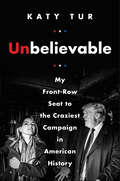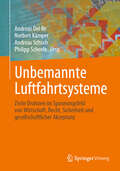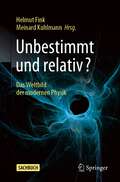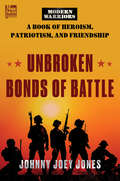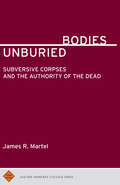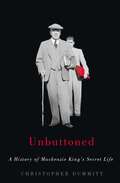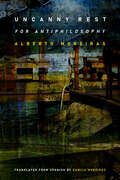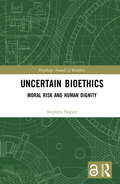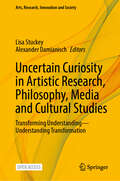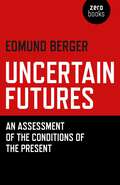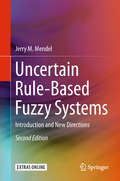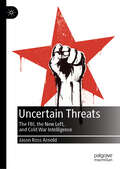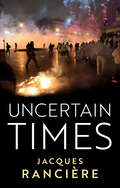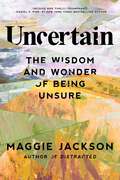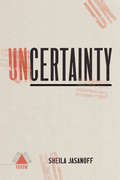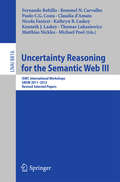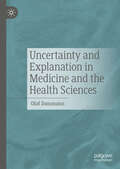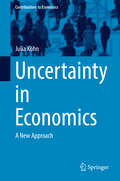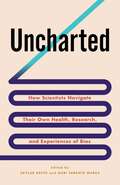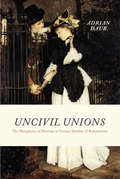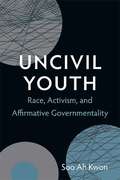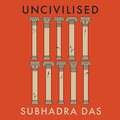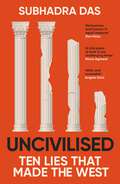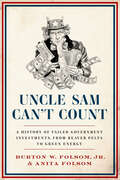- Table View
- List View
Unbelievable: My Front-Row Seat to the Craziest Campaign in American History
by Katy TurThe New York Times bestseller. “This book couldn’t be more timely, appearing as President Trump ratchets up his attacks on the news media.” —Jill Abramson, The New York Times Book ReviewKaty Tur lived out of a suitcase for a year and a half, following Trump around the country, powered by packets of peanut butter and kept clean with dry shampoo. She visited forty states with the candidate, made more than three,800 live television reports, and tried to endure a gazillion loops of Elton John’s “Tiny Dancer” —a Trump rally playlist staple.From day one to day 500, Tur documented Trump’s inconsistencies, fact-checked his falsities, and called him out on his lies. In return, Trump repeatedly singled Tur out. He tried to charm her, intimidate her, and shame her. At one point, he got a crowd so riled up against Tur, Secret Service agents had to walk her to her car.None of it worked. Facts are stubborn. So was Tur. She was part of the first women-led politics team in the history of network news. The Boys on the Bus became the Girls on the Plane. But the circus remained. Through all the long nights, wild scoops, naked chauvinism, dodgy staffers, and fevered debates, no one had a better view than Tur.Unbelievable is her darkly comic, fascinatingly bizarre, and often scary story of how America sent a former reality show host to the White House. It’s also the story of what it was like for Tur to be there as it happened, inside a no-rules world where reporters were spat on, demeaned, and discredited. Unbelievable is a must-read for anyone who still wakes up and wonders, Is this real life?
Unbemannte Luftfahrtsysteme: Zivile Drohnen im Spannungsfeld von Wirtschaft, Recht, Sicherheit und gesellschaftlicher Akzeptanz
by Andreas Del Re Norbert Kämper Andreas Schoch Philipp ScheeleDrohnen sind längst von einer vielversprechenden Zukunftstechnologie zu einer etablierten Größe am Himmel geworden. Durch die zunehmenden Möglichkeiten ziviler Nutzung nimmt ihre Präsenz dabei immer noch zu, wodurch Fragen aufgeworfen werden, die schon heute beantwortet werden müssen. Neben den obligatorischen rechtlichen Fragen geht es dabei auch um den gesellschaftlichen Einfluss, den neue Technologie seit je her mit sich bringen. Welche rechtlichen Rahmenbedingungen sind nötig, wenn immer mehr Drohnen sich den Luftraum mit anderen Luftverkehrsteilnehmern teilen? Wie ist es um die Sicherheit, auch IT-Sicherheit bestellt, wenn zunehmend Drohnen über der Bevölkerung schweben? Welche ethischen Herausforderungen bringen unbemannte Systeme mit sich, die zunehmend autonom operieren? All jenen Fragen widmen sich die Autoren dieses Sammelbandes und schaffen so neue Zugänge und Perspektiven auf das Zukunftsthema der Unbemannten Luftfahrtsysteme.
Unbestimmt und relativ?: Das Weltbild der modernen Physik
by Meinard Kuhlmann Helmut FinkQuantentheorie und Relativitätstheorie haben das Weltbild der Physik revolutioniert. Beide Theorien gelten jedoch als unanschaulich und schwer verständlich. Dieses Sachbuch schafft neue Zugänge und lädt zum Mitdenken ein. Renommierte Experten aus Physik und Philosophie erläutern Grundbegriffe, Erkenntnisfortschritte und Deutungsfragen zu Raum, Zeit und Materie.Dabei kommen typische Themen aus der Philosophie der Physik zur Sprache, wie etwa die Interpretationsdebatte der Quantentheorie oder Modellbildungen in der Kosmologie. Weltbildrelevante Fragen nach dem Verhältnis von Mathematik, Empirie und Anschauung oder nach der Verlässlichkeit physikalischer Erkenntnis erfordern die Verbindung von Physik und Philosophie, von fachwissenschaftlicher Grundlagenforschung und methodenkritischer Reflexion. Der thematische Bogen geht zurück auf ein hochkarätig besetztes Symposium mit populärwissenschaftlicher Ausrichtung. Das Buch enthält Beiträge von Andreas Bartels, Robert Harlander, Paul Hoyningen-Huene, Gert-Ludwig Ingold, Claus Kiefer, Meinard Kuhlmann, Klaus Mainzer, Oliver Passon, Manfred Stöckler, Rüdiger Vaas und Reinhard Werner.
Unbroken Bonds of Battle: A Modern Warriors Book of Heroism, Patriotism, and Friendship
by Johnny Joey JonesINSTANT NEW YORK TIMES BESTSELLER!Life only really starts when we start serving others.For many people, military service isn’t simply a job. It’s a ticket out of a lonely society and into a family of enduring bonds.In over a decade of working with veterans, Johnny Joey Jones has discovered the power of battle-forged friendships. Suffering a life-changing injury while deployed in Afghanistan, he faced a daunting recovery. But coming home would have been much harder without the support of his brothers and sisters in arms.In Unbroken Bonds of Battle, Joey tells the stories of those very warriors, who for years have supported and inspired him on the battlefield and off. Through unfiltered and authentic conversations with American heroes in every branch of service, Joey tackles the big questions about life, loss, and, of course, hunting.Powerful life lessons are woven throughout these personal oral histories. Also included is a scrapbook of beautiful candid photographs from the lives of these modern warriors.A gorgeous patriotic keepsake, Unbroken Bonds of Battle reminds us of the costs paid by those who defend our freedom through unvarnished, inspiring tales of friendship.
Unburied Bodies: Subversive Corpses and the Authority of the Dead
by James R. MartelThe human body is the locus of meaning, personhood, and our sense of the possibility of sanctity. The desecration of the human corpse is a matter of universal revulsion, taboo in virtually all human cultures. Not least for this reason, the unburied corpse quickly becomes a focal point of political salience, on the one hand seeming to express the contempt of state power toward the basic claims of human dignity—while on the other hand simultaneously bringing into question the very legitimacy of that power. In Unburied Bodies: Subversive Corpses and the Authority of the Dead, James Martel surveys the power of the body left unburied to motivate resistance, to bring forth a radically new form of agency, and to undercut the authority claims made by state power. Ranging across time and space from the battlefields of ancient Thebes to the streets of Ferguson, Missouri, and taking in perspectives from such writers as Sophocles, Machiavelli, Walter Benjamin, Hannah Arendt, James Baldwin, Judith Butler, Thomas Lacqueur, and Bonnie Honig, Martel asks why the presence of the abandoned corpse can be seen by both authorities and protesters as a source of power, and how those who have been abandoned or marginalized by structures of authority can find in a lifeless body fellow accomplices in their aspirations for dignity and humanity.
Unbuttoned: A History of Mackenzie King's Secret Life
by Christopher DummittHow Canadians reimagined what a politician should be.
Uncanny Rest: For Antiphilosophy
by Alberto MoreirasIn Uncanny Rest Alberto Moreiras offers a meditation on intellectual life under the suspension of time and conditions of isolation. Focusing on his personal day-to-day experiences of the “shelter-in-place” period during the first months of the coronavirus pandemic, Moreiras engages with the limits and possibilities of critical thought in the realm of the infrapolitical—the conditions of existence that exceed average understandings of politics and philosophy. In each dated entry he works through the process of formulating a life’s worth of thought and writing while attempting to locate the nature of thought once the coordinates of everyday life have changed. Offering nothing less than a phenomenology of thinking, Moreiras shows how thought happens in and out of a life, at a certain crossroads where memories collide, where conversations with interlocutors both living and dead evolve and thinking during a suspended state becomes provisional and uncertain.
Uncertain Bioethics: Moral Risk and Human Dignity (Routledge Annals of Bioethics)
by Stephen NapierBioethics is a field of inquiry and as such is fundamentally an epistemic discipline. Knowing how we make moral judgments can bring into relief why certain arguments on various bioethical issues appear plausible to one side and obviously false to the other. Uncertain Bioethics makes a significant and distinctive contribution to the bioethics literature by culling the insights from contemporary moral psychology to highlight the epistemic pitfalls and distorting influences on our apprehension of value. Stephen Napier also incorporates research from epistemology addressing pragmatic encroachment and the significance of peer disagreement to justify what he refers to as epistemic diffidence when one is considering harming or killing human beings. Napier extends these developments to the traditional bioethical notion of dignity and argues that beliefs subject to epistemic diffidence should not be acted upon. He proceeds to apply this framework to traditional and developing issues in bioethics including abortion, stem cell research, euthanasia, decision-making for patients in a minimally conscious state, and risky research on competent human subjects.
Uncertain Causation in Tort Law
by Diego M. Papayannis Martín-Casals, Miquel and Papayannis, Diego M. Miquel Martín-CasalsThis discussion of causal uncertainty in tort liability adopts a comparative approach in order to highlight the important normative, epistemological and procedural implications of the various proposed solutions. Occupying a middle ground between the legal perspective and the philosophical views that are at stake when it comes to the resolution of tort law cases in a context of causal uncertainty, the arguments will be of great interest to legal scholars, legal philosophers and advanced tort law students.
Uncertain Curiosity in Artistic Research, Philosophy, Media and Cultural Studies: Transforming Understanding—Understanding Transformation (Arts, Research, Innovation and Society)
by Lisa Stuckey Alexander DamianischThis open access edited volume is based on the premise that entanglements between current societal, political, technological, ecological, and cultural transformations cannot be sufficiently understood without transforming the modes, forms, and notions of understanding. Conceptually, &“uncertain curiosity&” is inspired by Helga Nowotny&’s Insatiable Curiosity, as it maps trends in the history of knowledge on creative curiosity and its shifting relation to innovation-promoting institutions and societal notions of un/certain and un/predictable futures. This volume explores epistemic, infrastructural, and cosmological conditions under which the curiosity drive can flourish. Adopting an encyclopedic structure, the contributions engage with terminologies that echo transformation processes and conditions of change by foregrounding the ephemeral, the processual, and the desynchronous and address issues of insurability, vagueness, and ambiguity. This is achieved through a blend of case study research, critical terminological work, poetic engagement with language, and visual culture and discourse analysis through the lenses of artistic research, philosophy, media and cultural studies.
Uncertain Futures: An Assessment Of The Conditions Of The Present
by Edmund BergerUncertain Futures: An Assessment of the Conditions of the Present provides a detailed look into the economic and political conditions of our present moment from a Marxist perspective. Key aspects of Marxist economic theory are illustrated in clear ways in order to provide an easy introduction to Marxist thought and their applicability. The book also examines the sluggish recovery from the Great Recession, in the context of the long-term feasibility of sustaining the capitalist system by placing it into a historical framework. It considers the necessity of social democratic reforms while calling for an anarchic re-invigoration of the politics of everyday life.
Uncertain Rule-Based Fuzzy Systems: Introduction And New Directions
by Jerry M. Mendel*Type-2 fuzzy logic: Breakthrough techniques for modeling uncertainty *Key applications: digital mobile communications, computer networking, and video traffic classification *Detailed case studies: Forecasting time series and knowledge mining *Contains 90+ worked examples, 110+ figures, and brief introductory primers on fuzzy logic and fuzzy sets Breakthrough fuzzy logic techniques for handling real-world uncertainty. The world is full of uncertainty that classical fuzzy logic cant model. Now, however, theres an approach to fuzzy logic that can model uncertainty: type-2 fuzzy logic. In this book, the developer of type-2 fuzzy logic demonstrates how it overcomes the limitations of classical fuzzy logic, enabling a wide range of applications from digital mobile communications to knowledge mining. Dr. Jerry Mendel presents a bottom-up approach that begins by introducing traditional type-1 fuzzy logic, explains how it can be modified to handle uncertainty, and, finally, adds layers of complexity to handle increasingly sophisticated applications. Coverage includes: *The sources of uncertainty and the role of membership functions *Type-2 fuzzy sets: operations, properties, and centro
Uncertain Threats: The FBI, the New Left, and Cold War Intelligence
by Jason Ross ArnoldWhat if the FBI&’s surveillance of the New Left wasn&’t only about repression and cynical self-interest? This book revisits one of the most controversial episodes of the Cold War: the FBI&’s counterintelligence investigations into the activist leaders of SDS and other radical groups. While scholars have rightly emphasized political overreach, constitutional violations, and the Bureau&’s institutional self-interest, newly declassified documents reveal that it also possessed a stream of intelligence — often fragmentary, sometimes credible — that pointed to international ties many scholars have overlooked or discounted. Through close historical analysis of this evolving intelligence picture, the book complicates the dominant narrative of Hoover-era surveillance. It shows how the FBI and other agencies perceived the New Left&’s developing connections to Cuba, North Vietnam, and other Communist powers, and why they came to see those ties as potential counterintelligence threats. Rather than defending the Bureau&’s conduct, the book seeks to understand it on its own terms, emphasizing how counterintelligence agencies operate amid deep uncertainty and limited oversight. In doing so, it offers a new perspective on the internationalization of the New Left, the nature of foreign influence, and the machinery of Cold War security. A work of historical and analytical recovery, it challenges prevailing narratives in U.S. political history, intelligence studies, and the historiography of the 1960s.
Uncertain Times
by Jacques RanciereThe global triumph of democracy was announced thirty years ago, promising an age of consensus in which the dispassionate consideration of objective problems would give birth to a world at peace. Today, these grand hopes lie in ruins, and the era touted as new has turned out to be remarkably similar to the old order. To understand why this might be so, we need to examine the nature of the consensus itself, which is not the peace that it promised but rather the map of a territory on which new forms of warfare are being waged. The objective reality that imposed itself at the end of the 1990s was an absolutized and globalized capitalism which has produced ever more inequality, exclusion and hate. In this book Jacques Rancière delivers a frank and piercing critique of the globalized capitalist consensus. The invasion of Iraq, the riots on Capitol Hill and the rise of the European far right all attest to the true nature of this consensus, as does the current state-sanctioned racism which exploits the disenchanted progressive tradition and is led by an intelligentsia that claims to be left-wing. At the same time, Rancière praises the dynamism of social movements which affirm the power of the assembly of equals and its capacity for worldmaking: autonomous protest collectives have proven themselves capable of opening breaches in the consensual order and challenging the post-1989 system of domination.
Uncertain: The Wisdom and Wonder of Being Unsure
by Maggie JacksonA Selection of The Next Big Idea Club!"Maggie Jackson&’s incisive and timely book is a provocative exploration of the surprising benefits of not knowing. . . and shows how this state of mind can jolt us from intellectual complacency and foster creativity, resilience, and mutual understanding. Uncertain is a triumphant ode to the wisdom of being unsure.&” – Daniel H. Pink, #1 New York Times-bestselling author of The Power of Regret, Drive, and When"With cutting-edge science and insights both surprising and practical, Uncertain shows how cultivating an open and unsettled mindset can help us to spark curiosity, compassion, and creativity." – Gretchen Rubin, New York Times-bestselling author of The Happiness Project and Life in Five Senses"…remarkable and persuasive…" —Library JournalA revolutionary guide to flourishing in times of flux and angst by harnessing the overlooked power of our uncertainty.In an era of terrifying unpredictability, we race to address complex crises with quick, sure algorithms, bullet points, and tweets. How could we find the clarity and vision so urgently needed today by being unsure? Uncertain is about the triumph of doing just that. A scientific adventure tale set on the front lines of a volatile era, this epiphany of a book by award-winning author Maggie Jackson shows us how to skillfully confront the unexpected and the unknown, and how to harness not-knowing in the service of wisdom, invention, mutual understanding, and resilience.Long neglected as a topic of study and widely treated as a shameful flaw, uncertainty is revealed to be a crucial gadfly of the mind, jolting us from the routine and the assumed into a space for exploring unseen meaning. Far from luring us into inertia, uncertainty is the mindset most needed in times of flux and a remarkable antidote to the narrow-mindedness of our day.In laboratories, political campaigns, and on the frontiers of artificial intelligence, Jackson meets the pioneers decoding the surprising gifts of being unsure. Each chapter examines a mode of uncertainty-in-action, from creative reverie to the dissent that spurs team success. Step by step, the art and science of uncertainty reveal being unsure as a skill set for incisive thinking and day-to-day flourishing.
Uncertainty (Boston Review / Forum)
by Sheila JasanoffA wide-raging exploration of the place of uncertainty in our emotional and political lives.From climate change to the pandemic, uncertainty looms large over our public and personal lives. It is also the core feature of democratic life: while democratic governance seemingly heightens individual power, it exposes our life chances to the uncertain activity of others. We do not exercise control over those to whom we appeal, and yet we are constantly dependent on their actions for the goods in life we seek. Sheila Jasanoff opens a forum on uncertainty and democracy in this volume, arguing that ideas around our autonomy, our freedom, and our individual agency, particularly in the US, obscure our dependence on others in so many ways. To recognize this political emotion is to start to see the transformative potential in uncertainty. The debate that follows explores the ideas about uncertainty and experts in a democracy, as well its scientific, philosophic, and emotional aspects.
Uncertainty Reasoning for the Semantic Web III
by Fernando Bobillo Rommel N. Carvalho Paulo C. G. Costa Claudia D'Amato Nicola Fanizzi Kathryn B. Laskey Kenneth J. Laskey Thomas Lukasiewicz Matthias Nickles Michael PoolThis book contains revised and significantly extended versions of selected papers from three workshops on Uncertainty Reasoning for the Semantic Web (URSW), held at the International Semantic Web Conferences (ISWC) in 2011, 2012, and 2013. The 16 papers presented were carefully reviewed and selected from numerous submissions. The papers included in this volume are organized in topical sections on probabilistic and Dempster-Shafer models, fuzzy and possibilistic models, inductive reasoning and machine learning, and hybrid approaches.
Uncertainty and Explanation in Medicine and the Health Sciences
by Olaf DammannThis book offers a comprehensive account of how uncertainty is tackled in medicine and the health sciences. Olaf Dammann explores recent accounts of medicine as ineffective and suggests that the impression that medicine does not achieve its goal is, at least in part, due to the aleatoric (natural) uncertainty of biomedical processes and the subsequent epistemic (cognitive) uncertainty of those who desire solid information about such processes. Dammann shows how concepts like inference, explanation, and causometry help mitigate this disconnect. He points toward the possibility that some of the statistically rigid and formalized approaches (such as the randomized controlled trial as the gold standard for the justification of medical interventions) might better be replaced by approaches that emphasize the coherence of evidence and the people’s needs for helpful health interventions (auxiliarianism).
Uncertainty in Economics
by Julia KöhnIn this book the author develops a new approach to uncertainty in economics, which calls for a fundamental change in the methodology of economics. It provides a comprehensive overview and critical appraisal of the economic theory of uncertainty and shows that uncertainty was originally conceptualized both as an epistemic and an ontological problem. As a result of the economic professions’ attempt to become acknowledged as a science, the more problematic aspect of ontological uncertainty has been neglected and the subjective probability approach to uncertainty became dominant in economic theory. A careful analysis of ontological theories of uncertainty explains the blindness of modern economics to economic phenomena such as instability, slumps or excessive booms. Based on these findings the author develops a new approach that legitimizes a New Uncertainty Paradigm in economics.
Uncharted: How Scientists Navigate Their Own Health, Research, and Experiences of Bias
by Skylar Bayer Gabriela Serrato MarksPeople with disabilities are underrepresented in STEM fields, and all too often, they face isolation and ableism in academia. Uncharted is a collection of powerful first-person stories by current and former scientists with disabilities or chronic conditions who have faced changes in their careers, including both successes and challenges, because of their health. It gives voice to common experiences that are frequently overlooked or left unspoken. These deeply personal accounts describe not only health challenges but also the joys, sorrows, humor, and wonder of science and scientists.With a breadth of perspectives on being disabled or chronically ill, these stories highlight the intersectionality of minoritized identities with the disability community. Uncharted features essays by contributors who are d/Deaf, blind, neurodivergent, wheelchair users, have experienced traumatic brain injuries, have blood sugar disorders, have rare medical diagnoses, or have received psychiatric diagnoses, among many others. In many cases, the scientific field is not fully accessible to them, and they frankly describe struggling as well as thriving alongside their conditions.This book serves as representation for scientists who have never felt comfortable disclosing their disability or who have never felt fully understood. The stories shared in this book seek to normalize medical conditions and disabilities in scientific culture, offering recommendations for how and why to improve access. Uncharted is vital and compelling reading for current and aspiring scientists who want to make their fields more inclusive and supportive for everyone.
Uncivil Unions: The Metaphysics of Marriage in German Idealism and Romanticism
by Adrian Daub“What a strange invention marriage is!” wrote Kierkegaard. “Is it the expression of that inexplicable erotic sentiment, that concordant elective affinity of souls, or is it a duty or a partnership . . . or is it a little of all that?” Like Kierkegaard a few decades later, many of Germany’s most influential thinkers at the turn of the eighteenth century wondered about the nature of marriage but rejected the easy answers provided by biology and theology. In Uncivil Unions, Adrian Daub presents a truly interdisciplinary look at the story of a generation of philosophers, poets, and intellectuals who turned away from theology, reason, common sense, and empirical observation to provide a purely metaphysical justification of marriage. Through close readings of philosophers like Fichte and Schlegel, and novelists like Sophie Mereau and Jean Paul, Daub charts the development of this new concept of marriage with an insightful blend of philosophy, cultural studies, and theory. The author delves deeply into the lives and work of the romantic and idealist poets and thinkers whose beliefs about marriage continue to shape ideas about gender, marriage, and sex to the present day.
Uncivil Youth: Race, Activism, and Affirmative Governmentality
by Kwon Soo AhIn Uncivil Youth, Soo Ah Kwon explores youth of color activism as linked to the making of democratic citizen-subjects. Focusing attention on the relations of power that inform the social and political practices of youth of color, Kwon examines how after-school and community-based programs are often mobilized to prevent potentially "at-risk" youth from turning to "juvenile delinquency" and crime. These sorts of strategic interventions seek to mold young people to become self-empowered and responsible citizens. Theorizing this mode of youth governance as "affirmative governmentality," Kwon investigates the political conditions that both enable youth of color to achieve meaningful change and limit their ability to do so given the entrenchment of nonprofits in the logic of a neoliberal state. She draws on several years of ethnographic research with an Oakland-based, panethnic youth organization that promotes grassroots activism among its second-generation Asian and Pacific Islander members (ages fourteen to eighteen). While analyzing the contradictions of the youth organizing movement, Kwon documents the genuine contributions to social change made by the young people with whom she worked in an era of increased youth criminalization and anti-immigrant legislation.
Uncivilised: Ten Lies that Made the West
by Subhadra DasSome things are a given. The value of a good education. Time's progress. Death.Except most of the ideas that form Western Civilisation are just that - ideas. Taking cues from Greek philosophy and honed in the Enlightenment, certain notions about humanity and human society grew into the tenets we live by, and we haven't questioned them a great deal since. But isn't it time we asked who really benefits from the values at the core of our society? How much truth lies in a science that conjured up 'race'? Who do laws and nations really protect? Why does it feel like time is money? What even is 'art'?And the real question - is the West really as 'civilised' as it thinks it is?This audiobook will put everything back on the table and ask listeners to reconsider what they thought they knew about civilisation. Taking 10 core values of Western Civilisation in turn, it will examine the root of the idea, how it developed, and how it's impacted the way we live. Most importantly it will reveal how each of these ideas was either created in opposition to another group of people, or based on ideas they had first (and better). (Un)civilised will ask listeners to open their eyes to the why behind how they think the world works.(P) 2024 Hodder & Stoughton Limited
Uncivilised: Ten Lies that Made the West
by Subhadra DasPre-order the enthralling and radical book that overturns our assumptions about civilisation and society'A witty and accessible survey of the shortcomings of western civilisation as many people imagine it' ANGELA SAINI, author of Superior'A vital piece of work in our challenging times that reminds us of the rich history and influences outside the West. Das writes with passion and humour to open our eyes to the history that has shaped our world' ROMA AGRAWAL, author of Built and Nuts and Bolts___________Some things are a given: knowledge is power, time is money, justice is blind. But many of the big ideas that underpin Western civilisation are just that - ideas. Taking cues from Greek philosophy and honed in the Enlightenment, certain notions about humanity and society grew into the tenets we still live by today, and we haven't questioned them a great deal since.But what if they're not just ideas? What if they're outright lies? Isn't it time we asked who really benefits from the values at the core of our society? What is unbiased about a science that conjured up 'race'? Who do laws and nations actually protect? What even is 'art'? And the real question: is the West really as 'civilised' as it thinks it is?Uncivilised puts everything back on the table and asks readers to reconsider what they thought they knew about civilisation, starting with the ten lies that have shaped their lives.
Uncle Sam Can't Count: A History of Failed Government Investments, from Beaver Pelts to Green Energy
by Burton W. Folsom Jr. Anita FolsomAn enlightening overview of America’s misadventures in economic investment from the Revolutionary era to the Obama administration.From the days of George Washington through World War II to today, government subsidies have failed the American people time and again. Draining the Treasury of cash, this doomed attempt to “pick winners” only serves to impede economic growth—and hurt the very companies receiving aid. But why does federal aid seem to have a reverse Midas touch? In Uncle Sam Can’t Count, Burt and Anita Folsom argue that federal officials don’t have the same abilities or incentives as entrepreneurs. In addition, federal control always leads to politicization. And what works for politicians often doesn’t work in the marketplace. Filled with examples of government failures and free market triumphs, from John Jacob Astor to the Wright Brothers, World War II amphibious landing craft to Detroit, Uncle Sam Can’t Count is a hard-hitting critique of government investment that demonstrates why business should be left exclusively to private entrepreneurs.
